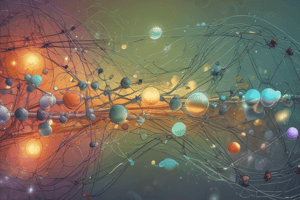Podcast
Questions and Answers
What is the primary characteristic of a chemical reaction?
What is the primary characteristic of a chemical reaction?
- Only physical properties of substances change.
- Atoms are rearranged to form new substances. (correct)
- Energy is neither absorbed nor released.
- Atoms are created or destroyed.
Which equation represents a correct balanced symbol equation?
Which equation represents a correct balanced symbol equation?
- Cu + O → CuO
- 2Cu + O → CuO
- 2Cu + O₂ → 2CuO (correct)
- Cu + 2O → 2CuO
In an exothermic reaction, energy is transferred to the surroundings which results in what change in temperature?
In an exothermic reaction, energy is transferred to the surroundings which results in what change in temperature?
- Temperature fluctuates randomly.
- Temperature remains the same.
- Temperature of the surroundings increases. (correct)
- Temperature of the surroundings decreases.
What happens to mass during a chemical reaction according to the law of conservation of mass?
What happens to mass during a chemical reaction according to the law of conservation of mass?
What type of reaction involves a substance breaking down into simpler substances usually requiring heat?
What type of reaction involves a substance breaking down into simpler substances usually requiring heat?
Which fuel produces carbon dioxide and water when combusted?
Which fuel produces carbon dioxide and water when combusted?
Which term describes substances that speed up a reaction without being consumed in the process?
Which term describes substances that speed up a reaction without being consumed in the process?
Which of the following is NOT a characteristic of a physical change?
Which of the following is NOT a characteristic of a physical change?
What is the primary environmental concern associated with the combustion of fossil fuels?
What is the primary environmental concern associated with the combustion of fossil fuels?
Which of the following statements is true regarding combustion?
Which of the following statements is true regarding combustion?
Flashcards
Chemical Reaction
Chemical Reaction
A process that rearranges atoms to form new substances. Atoms are joined in different ways, resulting in changes to the substances involved.
Reactants
Reactants
The substances that react in a chemical reaction.
Products
Products
The substances produced by a chemical reaction.
Word Equation
Word Equation
Signup and view all the flashcards
Balanced Symbol Equation
Balanced Symbol Equation
Signup and view all the flashcards
Exothermic Reaction
Exothermic Reaction
Signup and view all the flashcards
Endothermic Reaction
Endothermic Reaction
Signup and view all the flashcards
Conservation of Mass
Conservation of Mass
Signup and view all the flashcards
Catalyst
Catalyst
Signup and view all the flashcards
Thermal Decomposition
Thermal Decomposition
Signup and view all the flashcards
Study Notes
Chemical Reactions
- A chemical reaction is the rearrangement of atoms to form new substances.
- Reactants are the starting materials, products are the final substances.
- Word equations use names of substances, symbol equations use formulas.
- Example: Copper + Oxygen → Copper Oxide (word equation) ; 2Cu + O₂ → 2CuO (symbol equation)
What Happens During a Reaction
- All chemical reactions involve an energy transfer.
- Endothermic Reactions: Energy is transferred from the surroundings to the reaction mixture. Reaction feels cold.
- Exothermic Reactions: Energy is transferred from the reaction mixture to the surroundings. Reaction feels hot.
- Examples of energy transfer: Thermal decomposition (heat needed for decomposition), Combustion (a fuel burning in oxygen).
Conservation of Mass
- In a chemical reaction, atoms are neither created nor destroyed.
- The total mass of the reactants equals the total mass of the products.
- Mass can appear to change if there is a gas involved (it escapes).
Types of Reactions
- Decomposition: A substance breaks down into simpler substances. Thermal decomposition specifically means it needs heating.
- Combustion: A substance reacts with oxygen to release heat. An example is burning fuels.
- Oxidation: A substance reacts with oxygen. Combustion is a type of oxidation reaction.
Speed of Reactions
- Reactions can be fast or slow.
- Catalysts speed up reactions without being used up.
Changes of State
- Changes of state (solid, liquid, gas) are physical changes, not chemical reactions. They are reversible. For example: water, ice, and steam are all water (H₂O) in different states.
Key Terms
- Balanced symbol equation: An equation where the number of atoms of each element is the same on both sides of the equation.
- Catalyst: A substance that speeds up a reaction without being used up.
- Chemical reaction: A process that changes substances into new substances.
- Combustion: A chemical reaction with oxygen which releases energy as heat and light.
- Conservation of mass: The total mass of reactants equals the total mass of products.
- Decomposition: A reaction where a complex substance breaks down into simpler substances.
- Endothermic: A reaction that absorbs energy from the surroundings.
- Exothermic: A reaction that releases energy to the surroundings.
- Fossil fuel: A fuel formed from the remains of organisms over millions of years.
- Fuel: A substance that reacts with oxygen to release energy.
- Non-renewable: Resources that are used up faster than they are replaced.
- Oxidation: A reaction between a substance and oxygen.
- Physical change: A change in state or form of a substance without changing its chemical composition.
- Product: The substance(s) formed in a chemical reaction.
- Reactant: The substance(s) that react in a chemical reaction.
- Renewable: Resources that can be replenished.
Studying That Suits You
Use AI to generate personalized quizzes and flashcards to suit your learning preferences.




